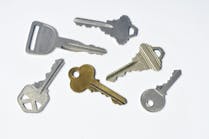Locksmith licensing can be a controversial topic, with some members of the locksmith community firmly behind it and others just as firm in their opposition. The pro-licensing argument is that unqualified locksmiths will be driven out of business, while licensed locksmiths will increase their professional standing. On the other hand, some long-time locksmiths oppose further government regulation and the additional fees and training requirements that may be included.
At this time, a locksmith license is required in nine states. Here is a roundup of the states and their regulations. Check with the individual states for fee amounts, which are subject to change. Most require a background check, proof of liability insurance and some type of testing or minimal educational requirements.
Comprehensive licensing information is available on the Associated Locksmiths of America (ALOA) home page, www.aloa.org, under the Legislation heading.
ALABAMA
Alabama locksmiths are regulated by the Alabama Electronic Security Board of Licensure (http://www.aesbl.com/). Licensing requirements include a physical location, liability insurance, licensing fee, background check, and educational testing.
CALIFORNIA
All locksmiths in the State of California are required to carry a state locksmith license with them when performing locksmith duties.
California locksmith licensing gives administration and enforcement of the law to the Director of the Department of Consumer Affairs, Bureau of Security and Investigative Services at: www.dca.ca.gov/bsis/locksmith.
ILLINOIS
In Illinois , t he Private Detective, Private Alarm, Private Security and Locksmith Act requires locksmith licensing through the Department of Professional Regulation.
Requirements: at least 21 years old; background check; successfully passed an exam authorized by the department; and proof of insurance.
Further information: http://www.idfpr.com/dpr/WHO/lock.asp
LOUISIANA
The Louisiana State Fire Marshal issues rules and regulations, collects fees and enforces locksmith licensing. Requirements include proof of $500,000 liability insurance and valid worker's compensation insurance; application fee and background check.
Licenses are valid for one year. Individual licenses may be transferred from one firm to another for a fee.
NEW JERSEY
The state of New Jersey Board of Examiners of Electrical Contractors (http://www.state.nj.us/lps/ca/nonmedical/firealarm.htm) issues licenses for locksmiths and the alarm industry. Licenses are valid for three years. Applicants must be at least 18 years old, pass a background check and maintain a surety bond of at least $10,000.
The Master Locksmiths Association of New Jersey provides licensing information on its web site, http://www.mlanj.org/
NORTH CAROLINA
North Carolina locksmiths are required to carry their state-issued locksmith license with them when performing locksmith duties. Rules, regulations, application processing and enforcement are handled through the North Carolina Locksmith Licensing Board (http://www.nclocksmithboard.org).
Licensing requirements include passing a background check, successfully completing of an examination administered by the Board and payment of a required fee.
When opening a locked door, the locksmith must make a reasonable effort to verify that the customer is the legal owner of the vehicle or property or is authorized by the legal owner to gain access to the vehicle or property.
Licensing applications and information can be downloaded at http://www.northcarolinalocksmithsassociation.com/
OKLAHOMA
An applicant applying for a locksmith license must meet the following qualifications: is at least 21 years of age; has not been declared by any court of competent jurisdiction incompetent by reason of mental defect or disease, and has not been restored to competency; is not a habitual user of intoxicating liquors or habit-forming drugs; has not been dishonorably discharged from the Armed Services; is of good moral character; and meets such other standards as may be established by the Board relating to experience or knowledge of the locksmith industry.
The licensee is held responsible for the activities of the licensee's employees. Licensing is handled through the Oklahoma State Department of Health, http://www.health.state.ok.us/program/ol/info.html.
The Oklahoma Master Locksmiths Association (www.omla.com) held five special training sessions for its members as new licensing requirements took effect in early 2007. The Health Department is now in process of license implementation. The grandfathering period ended March 31, 2007.
TENNESSEE
Locksmiths must be registered or licensed with the Tennessee Commissioner of Commerce and Insurance.
Unlicensed persons are prohibited from possessing, using, selling, or offering to sell any code book, lock picking tool, manipulation key, try-out key, safe opening tool, car opening tool, or to design, make, manufacture, or install any master key or system of change keys and master keys.
A locksmith is required to obtain personal identification from a person requesting service before opening a vehicle or real property. The information must be on a work order or invoice and available for law enforcement with a proper court order during normal business hours.
A written and practical exam is required, as are background checks.
The Middle Tennessee Locksmiths Association also includes licensing information on its web site, http://www.midtnlocksmith.org/
TEXAS
Texas locksmiths must register with the Texas Board of Public Security, (www.txdps.state.tx.us. Proof of liability insurance and background checks are required.
A locksmith company or locksmith may not unlock a structure, motor vehicle, or other property unless the customer shows the locksmith government-issued identification, and provides a signed authorization stating that the customer is entitled to legal access to the structure, vehicle, or property.
The Texas Locksmith Association (www.texaslocksmiths.org) monitors legislation, licensing, and regulation to look after the interests of locksmiths in Texas . Licensing forms can be downloaded on the TLA web site.
CLA Helps Expose
Unlicensed Locksmiths
Recently KGO 7 News in San Francisco investigated a serious problem involving one particular unlicensed locksmith. In one case he charged a burglary victim over $5,000.00 to “repair” the door and frame, in what can best be called shoddy workmanship. In a second case, he charged over $3,000 to rekey nine locks.
California Locksmith Association members were happy to lend assistance in a variety of ways, including locating a suitable location for a hidden camera sting, providing skilled locksmiths to critique the aftermath of the unlicensed locksmith, and expert commentary.
We are outraged that out of over 2,300 “locksmiths” that appear on the AT&T Smartpages, only 58 are licensed locksmiths, says the CLA. Since being made aware of such problems, Verizon has deleted over 10,000 bogus listings from its online directory.
California Locksmith Association, www.cla4u.org





